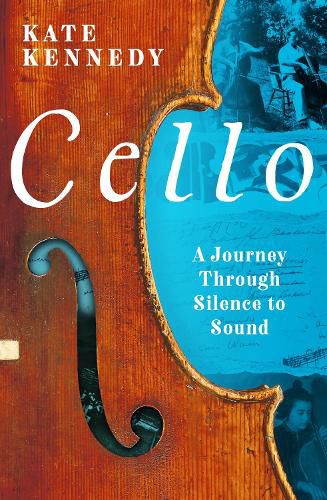Readings Newsletter
Become a Readings Member to make your shopping experience even easier.
Sign in or sign up for free!
You’re not far away from qualifying for FREE standard shipping within Australia
You’ve qualified for FREE standard shipping within Australia
The cart is loading…






Strikingly original' The Times 'Absorbing' Wall Street Journal
'Just as a cello's voice is divided across four strings, each with its own colour and character, this is a journey in four parts, in search of four players and their instruments...'
In Cello, Kate Kennedy weaves together the lives of four remarkable cellists who suffered various forms of persecution, injury and misfortune. The Hungarian Jewish cellist and composer Pal Hermann managed to keep one step ahead of the Gestapo for much of the Second World War but was eventually captured and murdered. Lise Cristiani, the first female professional cello soloist, undertook an epic - and ultimately fatal - concert tour of Siberia in the 1850s, taking with her one of the world's greatest Stradivari cellos. Anita Lasker-Wallfisch was incarcerated in both Auschwitz and Bergen-Belsen camps, only surviving because she was the cellist in the Auschwitz-Birkenau women's orchestra. Amedeo Baldovino of the Trieste Piano Trio was forced to jump from a burning ship with his 'Mara' Stradivari, losing the cello, and nearly losing his own life when the boat was shipwrecked near Buenos Aires.
Counterpointing the themes raised by these extraordinary stories are a sequence of interludes that draw together the author's reflections on the nature and history of the cello, and her many interviews and encounters with contemporary cellists. Kate Kennedy's own relationship with the cello is a complicated one. As a teenager, she suffered an injury to her arm that imposed severe limitations on her career as a performer on the instrument that was her first love. She realised that, in order to start to understand what the cello meant to her, she needed to find out what the cello - and, crucially, the absence of the cello - had meant to some other cellists, past and present.
Kate Kennedy has written an eloquent and multitextured homage to this warmest of stringed instruments - part quest narrative, part detective story, part philosophical meditation.
$9.00 standard shipping within Australia
FREE standard shipping within Australia for orders over $100.00
Express & International shipping calculated at checkout
Strikingly original' The Times 'Absorbing' Wall Street Journal
'Just as a cello's voice is divided across four strings, each with its own colour and character, this is a journey in four parts, in search of four players and their instruments...'
In Cello, Kate Kennedy weaves together the lives of four remarkable cellists who suffered various forms of persecution, injury and misfortune. The Hungarian Jewish cellist and composer Pal Hermann managed to keep one step ahead of the Gestapo for much of the Second World War but was eventually captured and murdered. Lise Cristiani, the first female professional cello soloist, undertook an epic - and ultimately fatal - concert tour of Siberia in the 1850s, taking with her one of the world's greatest Stradivari cellos. Anita Lasker-Wallfisch was incarcerated in both Auschwitz and Bergen-Belsen camps, only surviving because she was the cellist in the Auschwitz-Birkenau women's orchestra. Amedeo Baldovino of the Trieste Piano Trio was forced to jump from a burning ship with his 'Mara' Stradivari, losing the cello, and nearly losing his own life when the boat was shipwrecked near Buenos Aires.
Counterpointing the themes raised by these extraordinary stories are a sequence of interludes that draw together the author's reflections on the nature and history of the cello, and her many interviews and encounters with contemporary cellists. Kate Kennedy's own relationship with the cello is a complicated one. As a teenager, she suffered an injury to her arm that imposed severe limitations on her career as a performer on the instrument that was her first love. She realised that, in order to start to understand what the cello meant to her, she needed to find out what the cello - and, crucially, the absence of the cello - had meant to some other cellists, past and present.
Kate Kennedy has written an eloquent and multitextured homage to this warmest of stringed instruments - part quest narrative, part detective story, part philosophical meditation.